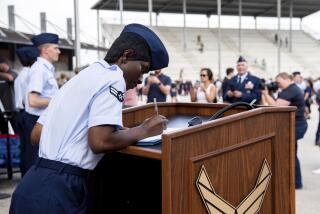Afghan interpreter pays a personal price
Reporting from Kabul, Afghanistan — The U.S. Army sergeant sat on a wooden bench wedged among the monotonous barracks at Camp Phoenix, inhaling deeply from a cigarette while reflecting on the course his life has taken and the shambles Afghanistan has become.
As he spoke, it became clear the Afghan-born 25-year-old had paid a price for being tied to two worlds.
American soldiers, sailors and Marines based in Afghanistan, thousands of miles from loved ones, find the separation heart-wrenching. For the sergeant at this base on the outskirts of Kabul, being five miles from family was even worse.
The sergeant’s parents, siblings and other relatives live a stone’s throw from Camp Phoenix, where he recently wrapped up a two-year posting. But he could not visit them, given the danger to himself, his family and the mission, although they did talk periodically on the phone.
As far as neighbors in Kabul are concerned, this tall, square-jawed man left for America in 2005. If word had spread in this tribal society with very few secrets -- gossip here flies faster than the wind -- that he’d joined the U.S. Army, Taliban militants could well make an example of his family. The risks are huge, so he asked that he not be named, given what he said is a $1-million-plus price tag on his head.
“I haven’t seen them since 2004, even though they’re 20 minutes away,” he said of his family. “It’s really, really hard. But if the bad guys learned about me, they’d probably kill them.”
Shortly after recounting his story, his tour of duty ended and he shipped back to the U.S., putting 14,000 miles and months, if not years, between him and what he hopes will be his eventual homecoming. He is in touch with his family every few weeks by phone.
Much of the sergeant’s life, marked by near-constant turmoil in Afghanistan, has been about bridging worlds. Even during the darkest years of Taliban control, his father, a structural engineer, and mother, a kindergarten teacher, made education a priority, confident that Afghanistan would one day rejoin the global community.
They sent their two sons and six daughters to secret home schools to study English, foreign literature and other secular subjects, defying rules that girls focus solely on religion.
“It’s a very tight family,” said Greg Motz, a police officer in Evansville, Ind., a National Guardsman who served with the sergeant in Afghanistan. “His mother and father sacrificed a lot for his education.”
The sergeant was jailed twice under Taliban rule. In the late 1990s, he was caught shaving his beard -- forbidden by the hard-line regime -- with the vanity of a teenager hoping it would grow back thicker.
In the second instance, at great personal risk he had helped an American accused of being a CIA agent, leading to his own arrest as a suspected collaborator. During the ensuing interrogation and beating, he lied about his identity to protect his family.
In a lucky break, the central jail was full that day so he was detained in a house, from which he escaped while guards prayed.
After the U.S.-led invasion of Afghanistan in the wake of the Sept. 11 attacks, his language skills were in demand, and he landed a civilian job with the U.S. military as an interpreter, or “terp” in military-speak. In addition to English, he speaks Pashto, Dari, Persian, Urdu, French and Arabic.
American military colleagues describe him as sincere and ethical in a region where they feel relationships often trump morality. Soon he was asked to join Special Forces missions, local training exercises and hearts-and-minds operations.
“He wasn’t afraid to look a commander in the eye and correct him until he presented the proper courtesies,” said Steve Fippen, another Indiana police officer and former National Guardsman in Afghanistan. “He’d also explain to the Afghans that American men aren’t used to holding hands. He was an invaluable bridge.”
Even as he spanned the cultural divide, he watched their backs, colleagues said. Soon they were sharing operational details with him before missions, even posting him behind the machine gun when the patrol stopped for rest. “Let me just say, that’s not the case with many other interpreters,” Motz said.
On one patrol about seven years ago, armed villagers became aggressive. He told them to back down or the Americans would tear their village apart looking for bad guys, Fippen recalled.
“We were outgunned,” Fippen said. “But he bluffed, and it saved us. He’s a great young man.”
Around the same time, on a hearts-and-minds mission in Paktia province, he noticed that the strong downdraft from the helicopter had damaged crops, threatening to undermine any goodwill. He convinced the commander to pay the compensation the villagers demanded. After the troops built wells and a school, the villagers softened and even offered to return the money -- no small gesture in this impoverished country. The soldiers declined, insisting that it be used for schoolbooks. Before team members left, villagers cooked them a mutton feast.
In August 2005, his life took another turn when several of the guardsmen -- with the help of military logistics, a Rotary Club charity program, Ronald McDonald House and a volunteering heart surgeon -- organized heart surgery in the United States for an Afghan girl born with a congenital defect. He accompanied the girl and her father as their interpreter, explaining American ways to Afghans.
“He had to show them how to shop for clothes, use a Western toilet and toilet paper, basic stuff,” said Fippen, who hosted the girl for several weeks. “She used to stand on the sink and on the toilet. In the village, they almost never take a bath.”
By the time the girl and her father returned to Kabul in January 2006 -- she’s now healthy and living in Jalalabad -- he hatched a crazy dream for himself: The high school graduate would try to attend college in the United States.
There were several roadblocks, among them the tuition. He’d arrived with $50, thinking it would be enough.
“I didn’t know that $50 was nothing in America,” he said. “You buy a cake at Wal-Mart, and it’s gone.”
But several of the Americans he’d worked with in Afghanistan, appreciative of his years of help, encouraged him to take the entrance exams, get into a university in Indiana, get a student visa and line up scholarships, chipping in their own money as needed.
“I’ll appreciate them forever,” he said.
He missed his family, culture and Afghan food, an isolation compounded by not having a car. But his former buddies drove him to the mosque when he felt blue, where he met Afghans and other Muslims. “In America, you need a car for everything,” he said. “They really tried to keep me from being lonely. I honestly believe Americans are good people.”
In 2006, while he was studying political science and international relations at a university in Indiana, the Defense Department amended its “09 Lima” program, making it easier for those who’d worked overseas as interpreters to serve as soldiers and become U.S. citizens. The military’s demand for terps had grown, from a single contract for 30 interpreters in 1999 to thousands today. The “09L” program was recognition that it’s easier to teach a linguist to fight than the other way around.
He signed up, became a U.S. soldier and citizen and was deployed to Camp Phoenix where, for two years, he served as an interpreter and mentored Afghan army recruits. Being one of the terps made him a target of the Taliban, who view them as traitors and a linchpin in improved relations between foreign troops and the Afghan people, the sergeant said, something the militants don’t want.
Two good friends were hunted down by Taliban fighters, who often behead and cut up interpreters’ bodies. “They’re sending a message,” he said. “Under Islam, you don’t kill people, but animals you kill with a knife. They do this to scare us.”
But he’s not intimidated, he said, adding that U.S. success is the best hope for Afghanistan against neighboring countries intent on keeping his homeland weak. “My friends lost their lives for a great cause,” he said. “It makes me try even harder.”
The sergeant recently returned to Indiana, rented an apartment and plans to finish his last two years of college. But he admits to a few transition problems. Troops in Afghanistan tend to barrel down the middle of roads at high speed to avoid roadside bombs. “Here, you can’t drive like you’re in a combat zone,” he said.
“He’s gotten two tickets already,” said Christopher Lee, an attorney based in Evanston, a mentor and former commanding officer.
Lee said the sergeant is talkative and sociable, which has served him well in life, but that cracking the books isn’t always second nature.
“On occasion, I’ve had to threaten him with bodily harm,” Lee said, joking. “There are advantages to being his former commanding officer.”
The sergeant said the next bridge he wants to build involves taking his American college degree back to Afghanistan and helping his country.
“I’d like to be president or a minister and help make it a place that can stand on its own feet,” he said. “I hope someday I can help give Afghanistan a good name.”
More to Read
Sign up for Essential California
The most important California stories and recommendations in your inbox every morning.
You may occasionally receive promotional content from the Los Angeles Times.










